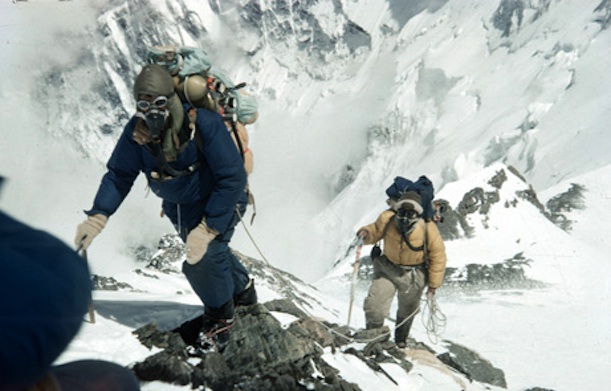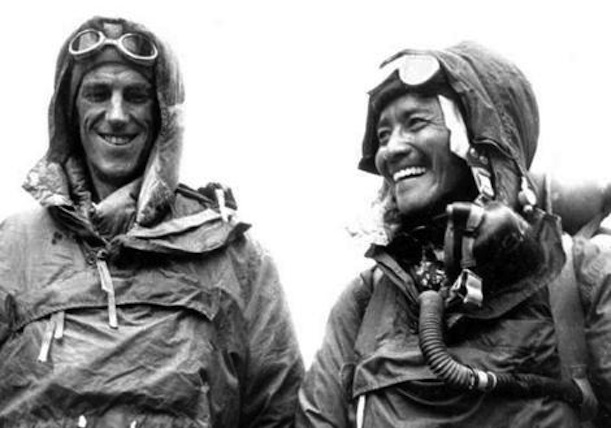Sixty Years Ago, Edmund Hillary Reached the Top of the World. Hear Him Describe It
Take a look back at an interview with Sir Edmund Hillary 60 years after he became the first man to summit Mount Everest

In 1953, Edmund Hillary and Tenzing Norgay became the first climbers reach the peak of Mount Everest. Listen to Hillary recount the journey in “Interview with Sir Edmund Hillary: Mountain Climbing,” a 1974 interview produced by Smithsonian Folkway Recordings. All photos courtesy of Flickr user agirregabiria
Sixty years ago, on May 29, 1953, mountaineers Edmund Hillary and Tenzing Norgay set foot atop Mount Everest, the world’s highest mountain. They were the first ever to reach its 29,029-foot peak, and met instant fame upon their return: today their ascent is considered a great achievement of the 20th century.
In 1974, Hillary, a New Zealander, detailed the perilous climb and his motivations for tackling it on “Interview with Sir Edmund Hillary: Mountain Climbing,” produced by Howard Langer at Smithsonian Folkways Recordings. The conversation touches topics from Hillary’s preparation for the perilous climb, the thrill of reaching the top and even the abominable snow man (Hillary thought he might have found its tracks while scaling Everest, but later discounted Yeti reports as unreliable).
Below, we’ve transcribed some highlights from the interview and posted an audio sample. You can check out the full interview’s script here, and order the recording here.
Sir Edmund, why do you climb mountains?
I think I mainly climb mountains because I get a great deal of enjoyment out of it. I never attempt to analyze these things too thoroughly, but I think that all mountaineers do get a great deal of satisfaction out of overcoming some challenge which they think is very difficult for them, or which perhaps may be a little dangerous. I think that the fact that something has a spice of danger about it can often add to its attraction, and to its fascination.
What would you say are the outstanding characteristics of a good mountaineer?
I think that a good mountaineer is usually a sensible mountaineer. He’s a man that realizes the dangers and difficulties involved, but, due to his experience and his technical skill, he’s able to tackle them calmly, with confidence. And yet you know the really good mountaineers that I know never lose that sense o enthusiasm that motivated them when they first started.
I think the really good mountaineer is the man with the technical ability of the professional, and with the enthusiasm and freshness of approach of the amateur.
How many men took part in the 1953 Everest Expedition?
On this expedition we had altogether 13 western members of the expedition, and then we had, I think, about 30 permanent high-altitude sherpas—these are men who will be carrying loads to high altitudes for us, and who are all hard, efficient performers. So then, altogether some 600 loads were carried into the Mt. Everest region on the backs of Nepalese porters, so we had 600 men who actually carried loads for 17 days, across country into our climbing region. Altogether, I suppose you could say that almost 700 men were involved in one way or the other. . . . It is a team expedition, and it’s very much in the form of a pyramid effort. . . . The two men who reach the summit are completely dependent on the combined effort of all those involved lower down.
How did you feel when you were going up those last several hundred feet?
I’ve often been asked as to whether I was always confident we were going to reach the summit of Everest. I can say no. Not until we were about 50 feet of the top was I ever completely convinced that we were actually going to reach the summit.
On a mountain like this, although the distances may not be so great, you’re so affected by the restrictions of the altitude that you never really can be completely confident that you’re going to be able to overcome the technical difficulties ahead of you.
And when you finally reached the top, what were your thoughts then?
I think my first thought on reaching the summit—of course, I was very, very pleased to be there, naturally—but my first thought was one of a little bit of surprise. I was a little bit surprised that here I was, Ed Hillary on top of Mt. Everest. After all, this is the ambition of most mountaineers.
What was Tensing’s reaction?
Well, Chet Tensing was, I think, on reaching the summit, certainly in many ways more demonstrative than I was. I shook hands with him, rather in British fashion, but this wasn’t enough for Tensing. He threw his arms around my shoulders—we were in oxygen masks and all—and he thumped me on the back and I thumped him on the back, and really it was quite a demonstrative moment. And he certainly was very, very thrilled when we reached the summit of Everest.
/https://tf-cmsv2-smithsonianmag-media.s3.amazonaws.com/accounts/headshot/paul-bisceglio-240.jpg)


/https://tf-cmsv2-smithsonianmag-media.s3.amazonaws.com/accounts/headshot/paul-bisceglio-240.jpg)